A Wanderer Named Chen Zhou Written by Ji Xin (Doctor of Art Theory, Central Academy of Fine Arts) Confusion Human beings live in the land and the land is closely connected with our destiny. The capital flows everywhere because of its pursuit of profit. It wants to occupy every corner of the world. At present, the popular Neo Liberalism politics pave the way for its flowing. Under the influence of its permeation, the destiny of human beings is reshaped and rewritten. After the Reform and Opening up, the tide of Marketlization has become much stronger over the past 30 years in China. Values worshiped in the past are swallowed by the logic of capital and can not be found any more. The profit-oriented worship of money shocks people and makes them confused. As a result, more and more distracted people are emerging: They are amazed by the cultural wonders but confused by the rapidly-changing reality. At the very beginning, Chen Zhou tries to describe such kind of situation in his paintings. In the series of work My Scenery in 2007, there is no scenery but “me”, a depressed wanderer. In this gloomy picture, “I” am naked, having nothing to rely on. “I” want to get out of the darkness but couldn’t find the way out. Eventually, “I” find that the brightness is on the opposite shore. A huge but indistinct candle representing brightness is in the front. “I” am placed in different situation by Chen Zhou to express his different understandings of the road to brightness. In one of his pictures, “I” am standing on the ground filled with nails. “My” feet are aching seriously while walking. In another picture, “I” have wounded wings, struggling to fly but fail. On some occasion, “I” become a candle. “I” am burning myself to bring some brightness to the gloomy sky. On the way to brightness, “I” should bear aching and blooding no matter what I choose. Thoughts of Chen Zhou in these paintings reflect the confusion of one generation. He tries to build a bridge between pain and hope, but this bridge doesn’t work well: the romantic narrations presented in these pictures are too direct. The future is full of hope but remains blurred and indistinct, so it could not become clear due to the ideal picture described in his works. Furthermore, his narrations are limited to an old framework. Such kind of framework prevents people from moving forward. It simplifies questions and filters the complicated reality. Therefore, it limits Chen Zhou’s further exploration of artistic language and topics, which results in the immaturity of his work in this period. This is the “first cry” of Chen Zhou, and this is just the beginning. After that, he realizes the problem and tries to utilize other artistic media. 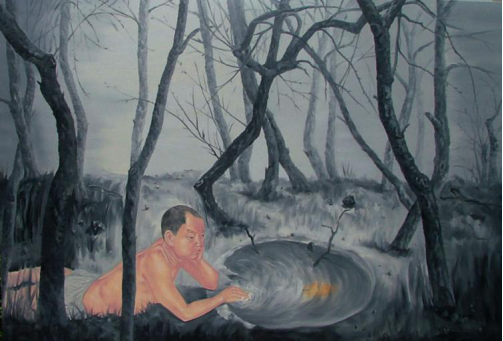
My Scenery 0719 Oil on Canvas 145x210cm 2007 Wandering In 2008, Chen Zhou created a performance art video named Monitor of Soul. In this work, Chen Zhou continues thinking questions similar to the ones in the work My Scenery: A distracted person is wandering, but he isn’t sure whether he could gain brightness and hope. This is the fundamental change of his way of thinking. Chen Zhou becomes the actor again. He is half-naked and painted with white pigment, symbolizing a soul. Walking from the forest to the suburban area, the soul finally walks into the city. He walks from the wonderful silence to the noise and stops at times. Sometimes he is pondering, but sometimes he is distracted. In his wandering around, it is believed that his home could be found at last. However, what is waiting for him is still a crossroad. He gains nothing but becomes more confused. From another perspective, what Chen Zhou wants to express is the impossibility and inaccessibility of soul tranquility. Under the influence of capitalism, we are partially potential patient of Schizophrenia or depression. It is fruitless to pursue tranquility unilaterally and the pursuit is doomed to fail. The failure of the “soul” is to tell us this is not the right road. Maybe the blind pursuit of the spiritual homeland is just an illusion. However, such illusion is used by the capital to attract customers and become the selling points, which is part of the contemporary ideology. The wicked capitalism is embodies from two aspects. On one hand, it causes spiritual crisis on a large scale; on the other hand, it claims that the mental medicine which can cure all diseases is invented. This is a highly profitable business. Our way out is to abandon it completely and get out of this network. Even we are wandering; we need to continue wandering rather than surrendering. We shouldn’t hug the tranquil homeland created by capitalism. A purposeless wanderer is better than a conformist who agrees with the current discourse order. Chen Zhou’s works mentioned above have similar thread, which represents the depressed wanderer and seeker. Starting from the artist’s own experience, Chen Zhou enlarges his own experience and sees something great in the small to describe certain condition of the whole society. But he is still limited to his own discourse. “Ego”, which is regarded as the source of power for the artist, becomes fragile like the concept “homeland” under the context of current capitalism. 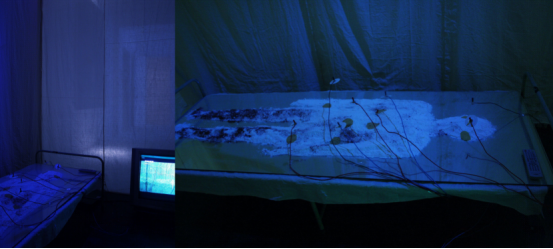
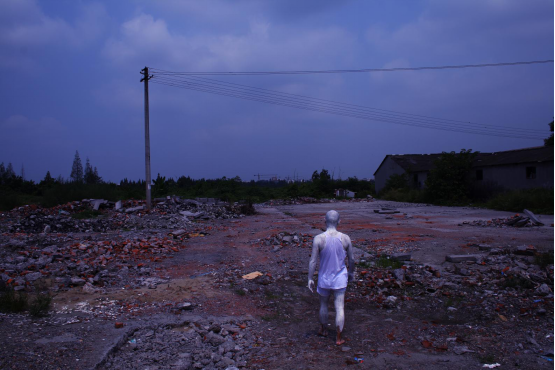
Monitor of Soul Materials: bed of ward, lime, natural silk, electric wire and wooden bench Changeable Size 2008 Concentration Camp Fireworks Streaking in Front of the Window is a short play. It reveals the state of Agamben’s “Concentration Camp” in the context of global capitalism. Chen Zhou sets up three different situations: school, factory and office. The latter two ones shock me most, especially the assembly line. In the closed space, there is no way out. People’s faces are covered with masks of sheep, which symbolizes that they are completely tamed. Their expressions are erased and the existence of their spirits is cancelled. People become hollow bodies, just like machines. The loss of face signifies the loss of Levinas’ “face to face” communication. People are numbers and exist anonymously like machine parts which can be replaced at any time. Their subjectivities are destroyed in their autonomous cooperation with orders and abidance of regulations. The machine-like bodies can easily and effectively get involved in the capitalist production. They manipulate machines skillfully but insensitively; they become the accessories of machines; they integrate with the productive system and become a huge productive installation of capitalism at last. The assembly line is the typical one. The school and office can not escape the misfortune and lose their subjectivity under the regulations of this system. This short play is not a dumb show since there is the chorus at the beginning. But I regard it as a dumb one. The chorus is performed according to the direction and the sound is lifeless, which is close to voiceless and mute. The performances are so inanimate. The oppression of the environment makes people creepy like seeing the doomsday. The sight of doomsday is not the destructive violence of war and disaster, but the capitalist destructive deprivation of people’s subjective position which turns human beings into machine-like bodies. The doomsday doesn’t refer to the end of the world. It is the maintenance of capitalist productive installations, which never change and make people scared. The capitalist productive installations never stop. They run day and night, the 24/7 model proposed by Jonathan Crary. With the overall development of Neo liberalism strategy and proposal of new Fordism, the benefits of workers can not be guaranteed. If they don’t’ obey the rules, they will be displaced quickly. The capitalism continues to tame people and force them to enter the world of depression and commit suicide. Just like what Stigler has ever said, the capitalism is producing patients of depression systematically. To some extent, insaneness and suicide are the only solution. People’s lives have died partly in that closed space long ago. According to Agamben, one of the capitalism’s goals is to alienate communication and maintain the emptiness. Because the community combined by communication and cooperation is the only way to resist the capitalism. Breaking orders, people in this play stand up, trying to shake hands and hug each other. Although their behaviors are very clumsy, the spark of hope is lighted up. At this moment, fireworks outside the window are lighted too. The play ends at this moment. The fireworks symbolize the beauty of hope. 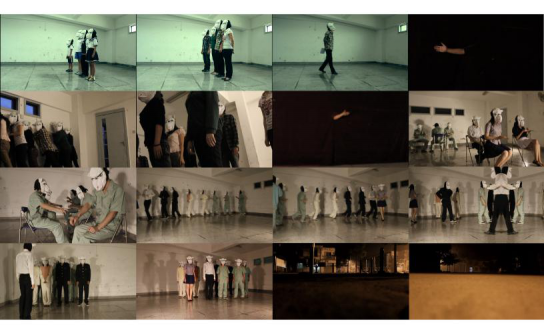
Fireworks Streaking in Front of the Window Media: Experimental Play DV 2011 Where to settle down For Chinese people, living houses and graves are equally important. However, under the strong power of the capital, cemeteries of the weak ones are changed into real estate by the businessmen to gain huge profits. Once the real estate developers work with the local government, , , , the villagers will lose their land. The land closely connected with the villagers’ lives is confiscated or bought to develop new estate. Because of huge profits, large areas of land in suburban areas are confiscated, including the cemeteries. Graves are the final home of the deceased. Chinese people attach great importance to their native land and are unwilling to leave it. The graves of the deceased can not be moved casually, or there would be misfortunes. However, under the pressure of the capital and power, the villagers have to compromise. The villagers have no other choices. When the original graves can not be protected, the bones of ancestors have nowhere to be placed. Obviously, the villagers don’t have the courage to abandon the custom of continuing the family line and sacrificing ancestors. The villagers had to find new places for their ancestors in the newly developed cemetery, which causes them to be lost in the profit trap of capitalism again. At this moment, Chen Zhou proposes his excellent plan. 。 Chen Zhou’s work is named Everlasting Grave. When the land where the deceased are buried is occupied more and more seriously, he creates a handcart which can move the whole grave easily. Chen Zhou doesn’t force the villagers to agree with his work but to bring them some stimulus. He doesn’t scold the villagers adopting a condescending manner. His work is somewhat inhuman and teasing like rubbing salt in a wound. Firstly, the villagers think that he is unreasonable. Gradually, people see his seriousness when he recommends his idea door to door. Undoubtedly, his “business” is a failure. Eventually, he immerses into the villagers’ lives as a stranger. Although there are fierce conflicts between him and villagers, he also guides them to introspect. From different perspectives, the artist and the villages discuss the important issue concerning death and final home, and move to the criticism of capital logic finally. He is just a passerby. After he leaves, the villagers’ discussion will end correspondingly and go back to agreeing with the exchange of equal value in the world of capitalism: we get what they pay and they can use our land. Everything returns to the original point and things like this happen everywhere. But Chen Zhou benefits a lot in the process from the resistance to mutual understanding. 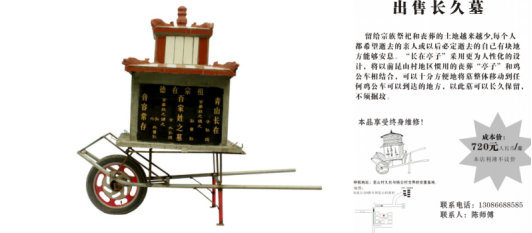
The Everlasting Grave Integrated media DV 2012 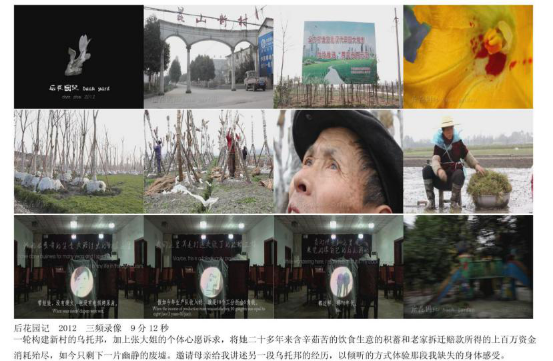 Back Yard 2012 3-Channel Video 9 m 12s A Utopia construction of new village costs Miss Zhang several million yuan which is earned by her hard work in catering business for more than twenty years together with the demolition compensation of her hometown. What remains nowadays is only a quiet ruined place. I try to experience the lost physical feeling by listening to my mother’s narration of another Utopia experience. Consumption To some extent, the modernization has destroyed the literati paintings and their cultural soil. With the disappearance of traditional culture and the development of natural environment, the literal paintings full of traditional ink and landscape are involved in an embarrassing situation: They have gradually submerged into history and become memories consisted of masterpieces. Such memories are hard to awake and float. However, Chinese people are so nostalgic that they still need them as media to make them psychologically comfortable. The urban life is never the Arcadian life. The most important part of urban life like underdevelopment, hard work and poverty are eliminated on purpose. It is idealized to attract people and make them reluctant to leave. Just like Zizek’s “coffee with no caffeine”, the Agritainment is such kind of urban life which has delicious food but no hard work. The Literati paintings and urban life have become a sign and product which are constantly being consumed. The work named Chinese Brush Painting meets Banana Garden is an irony. Chen Zhou decides to carry out an artistic practice of Chinese Ink Wash Painting in an Agritainment restaurant with students and friends. Different skills are used to imitate the literati paintings. Some of them are painting The Four Noble Ones on toilet paper, while others are “painting” Banana with bottles of Cola. Nowadays, the literati paintings and agritainments share the same destiny: They are useless except for their symbolized meanings, which are used by the capital to gain profit. The combination of the two ones causes mutation. Either of them is isolated from their original context. If they are to be served for consumption, let’s make the consumption more fierce and obvious. All of a sudden, the ink wash paintings and agritainments are threw into embarrassing situation and become voiceless. If something is carried to its extreme, it will become ineffective. 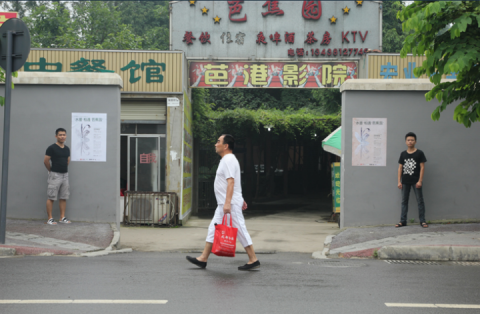
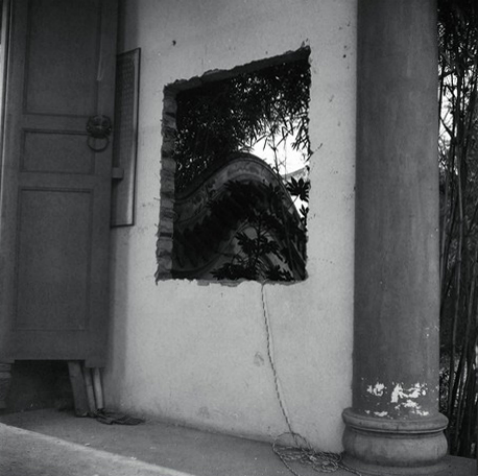
Write a Chinese character “Hui” Kui Sen Material: Photo Size: 11x11cmx10 2013 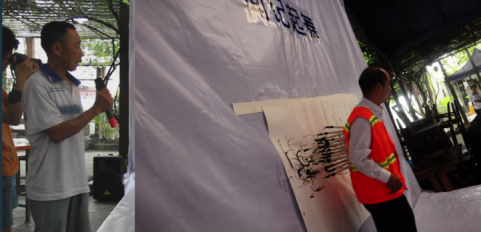
Dance to the Memory Chen Zhou Materials: Clothes of sanitation worker Writing brushes PVC pipes Ink Xuan Paper 2013 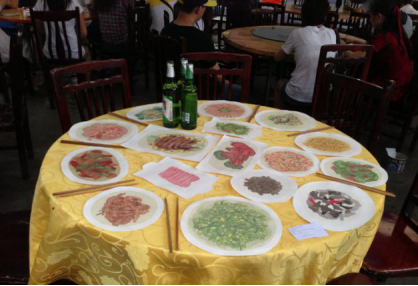
Whose Tasty Cuisine Yang Hong Materials: Raw Xuan Paper Bamboo Paper Bast Paper Changeable Size 2013 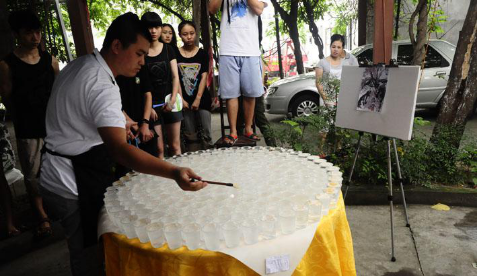
Painting Bananas Cui Xiaohua Materials: Plastic cups Mineral water Cola Writing Brush Copybook of banana tree Changeable Size 2013 
A Dried Well Chen Zhou Material: Ink wash painting on Xuan Paper 34x80cm 2013 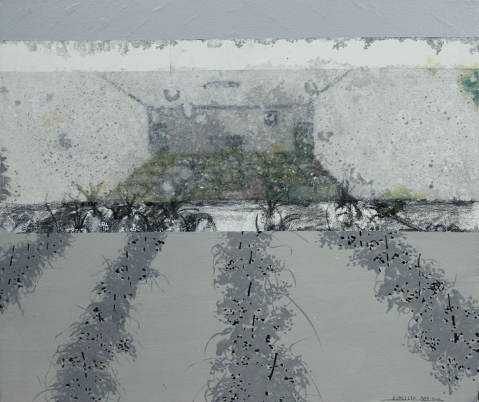
Lines and Bodies 2 Shui Lin Materials: Asphalt Ink Propylene Size 50x60cm 2013 Hope The aim and direction of Chen Zhou’s artistic creation is to find the chink in the atmosphere of global capitalism which has spread its snare everywhere. Some artists are unaware of being involved in the trap of capitalism. Nowadays, many cynic and rational artists are active on the stage. They conspire with the capital to create their own legend and brand. Later, their works are marked with their own brands and sells expensively. Chen Zhou doesn’t belong to this group. At the very beginning, he simply paints drawings full of romantic colors. Gradually, he begins to create works with unreasonable behaviors and other video works for the purpose of clearing the dense fog. He keeps trying to criticize and reflect the logic of capital. Bolch has ever said “Hopelessness is itself, in a temporal and factual sense, the most insupportable thing, downright intolerable to human needs.” The works of Chen Zhou don’t ignore hopelessness. Although he is aware of the hopelessness, he still brings us some hope. “The revolving of desires is revolution” Roland Barthes said. The current tasks for artists are to experience new things positively, break the leading emotional structure and tear the illusion of ideology existing everywhere. Chen Zhou always remains alert. Chen Zhou is like a guerrilla fighter. A variety of media are applied by him and he learns as he creates. This is the real condition of contemporary artist: he is uncertain of everything, but he keeps exploring in all his works. When the time and space are confiscated by the capital immeasurably, he’d like to be a joker and wanderer. |

